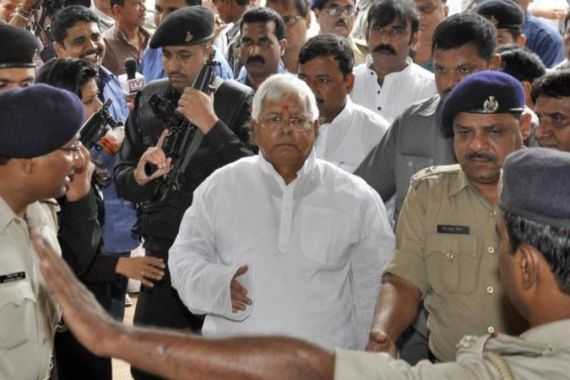Top Indian politician jailed over corruption
Court sentences Lalu Prasad Yadav to five years in jail for embezzling funds in the 1990s.

A former Indian federal minister and a prominent lawmaker was sentenced to five years in jail over a corruption scam, disqualifying him from parliament under new anti-graft rules, lawyers said.
Lalu Prasad Yadav, a current member of India’s Parliament who is allied with the government, was also ordered on Thursday to pay a $40,000 fine after the special court in the eastern city of Ranchi convicted him of embezzling funds intended to buy food for cattle during his tenure as the top elected official in the state of Bihar in the mid-1990s.
Yadav, along with 44 others were found to have defrauded a scheme intended to help farmers with their livestock to the tune of 380 million rupees ($6m).
Jagannath Mishra, another ex-chief minister of Bihar, was sentenced to four years in jail for his involvement in the scam, a prosecution lawyer said.
“The CBI (Central Bureau of Investigation) pleaded for a harsh punishment because it will work as a deterrent against corruption,” A K Singh, a lawyer for the federal police, told AFP news agency by phone after the sentencing.
“Such powerful people hardly get caught on corruption charges. If he did not get a harsh punishment it would send a wrong message to the people,” he added.
Yadav, 66, has always denied wrong-doing and his lawyer said he would appeal against his conviction in the High Court.
His Rashtriya Janata Dal party based in the state of Bihar, one of India’s poorest, is an ally of the government which supports the ruling coalition from the outside.
He will be disqualified from parliament in accordance with a Supreme Court order in July that state and national lawmakers should be ejected from office if sentenced to more than three years in jail.
The government of Prime Minister Manmohan Singh attempted to pass an executive order reversing the rule, but withdrew it in the face of internal dissent and widespread criticism.